Key takeaways:
- Cryptocurrency wallets vary in type (hardware, software, paper) and selecting the right one is crucial for securing digital assets.
- Wallet reviews are valuable for assessing security, usability, and user experiences, helping users avoid pitfalls.
- Key evaluation features include security measures, user interface design, and community support, which influence wallet trustworthiness.
- Authenticity in reviews is essential; users should prioritize practical insights over promotional content and ensure ongoing developer support.
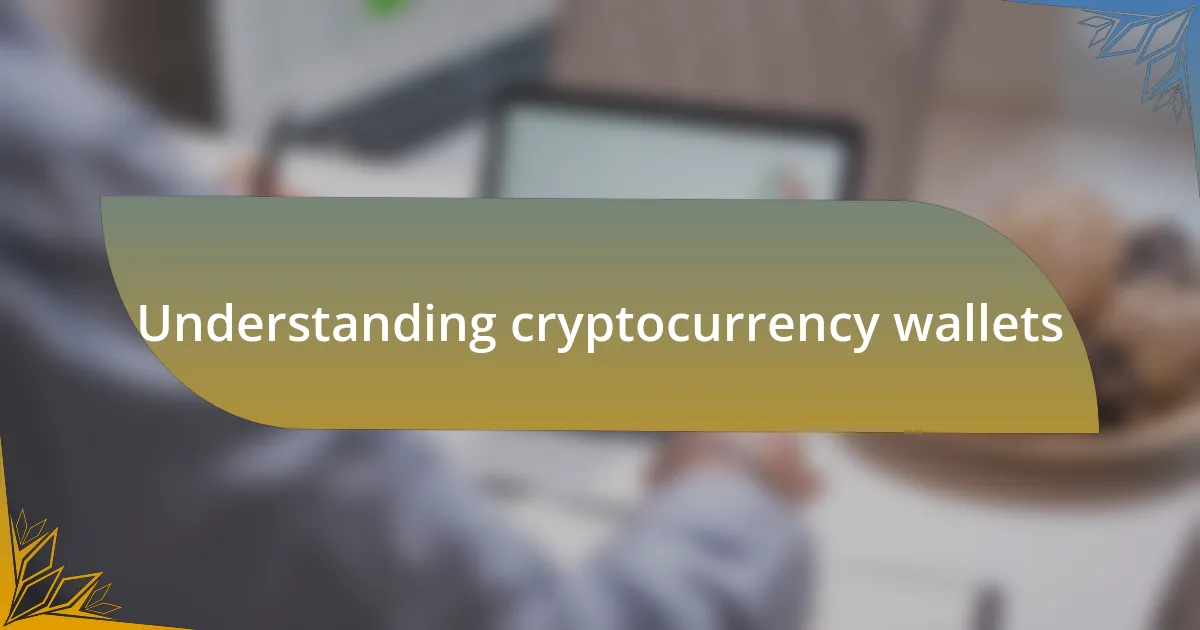
Understanding cryptocurrency wallets
Cryptocurrency wallets are essential tools for managing your digital assets. I remember the first time I set one up; it felt like unlocking a new world. Just like a physical wallet holds cash and cards, a crypto wallet stores your cryptocurrencies securely.
When I first dived into the crypto space, I was surprised to learn that there are different types of wallets—hardware, software, and paper—which each come with their own level of security and accessibility. Have you ever thought about how vulnerable digital wallets can be? It’s a stark reminder that choosing the right type is crucial for protecting your investments, much like choosing a bank for your savings.
Understanding the intricacies of how wallets work can be overwhelming at first. I remember grappling with terms like “private keys” and “public addresses”—it all sounded foreign. But these components are vital; the private key is your secret to access, while the public address is your wallet’s unique identifier, like your email address in the digital world.
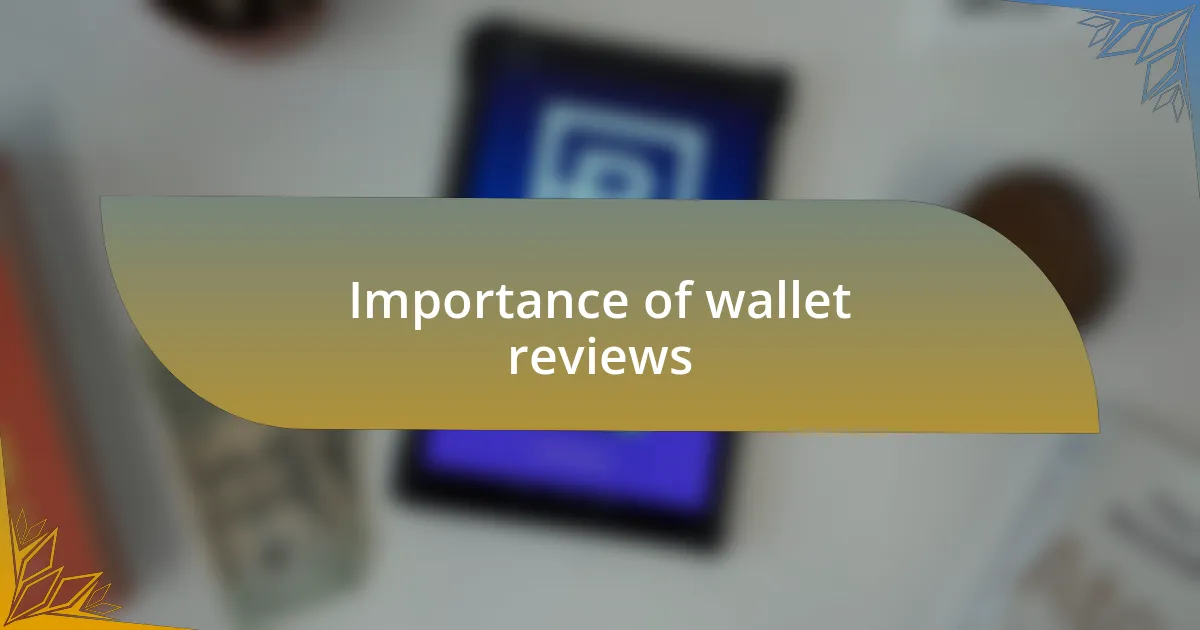
Importance of wallet reviews
Wallet reviews play a crucial role in helping users make informed decisions. When I first explored the world of cryptocurrency, the plethora of options left me feeling overwhelmed. I turned to wallet reviews to gain a sense of trust, realizing they provided insights into security, usability, and the experiences of others, which ultimately guided my choices.
Over time, I’ve learned that wallet reviews can reveal potential pitfalls that casual users might overlook. For example, I once read a review that alerted me to hidden fees associated with a popular wallet—something I would never have known without others sharing their experiences. That sense of community insight is invaluable; it fosters a more secure environment for all users navigating the crypto landscape.
Moreover, wallet reviews highlight ongoing updates and support from developers. I remember feeling nervous about using a wallet that hadn’t issued an update in months; it raised red flags for me. Feedback from real users can act as a valuable barometer for the reliability and responsiveness of wallet providers, helping newcomers avoid rocky paths in their cryptocurrency journeys.
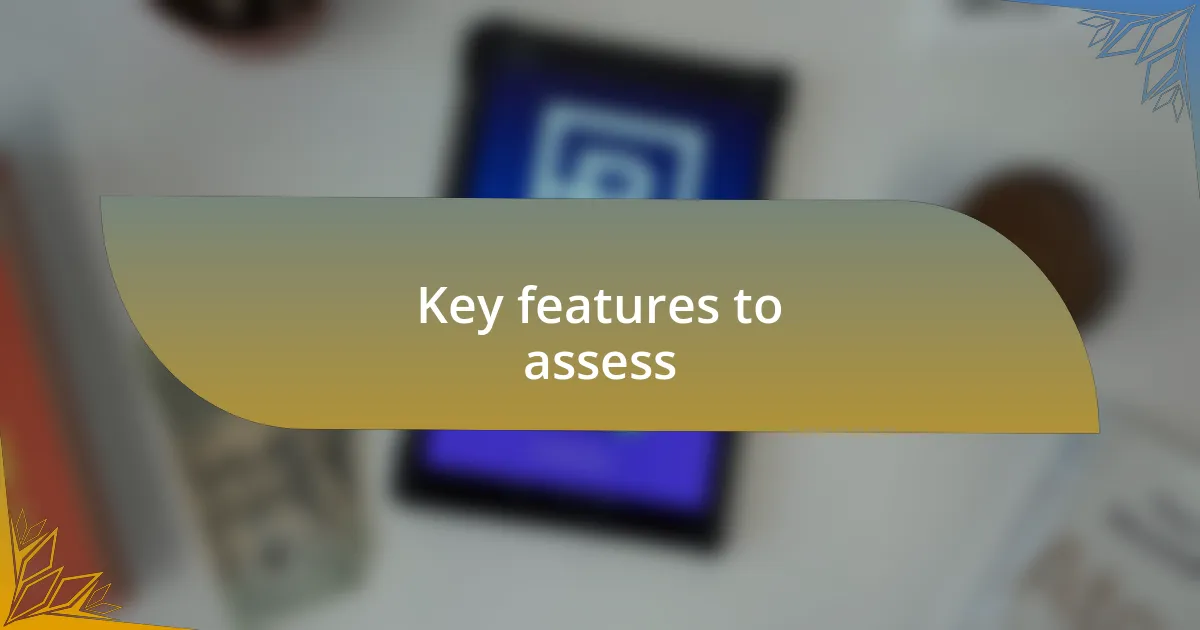
Key features to assess
When assessing wallet reviews, one key feature to evaluate is the wallet’s security measures. I once used a wallet that boasted advanced encryption but suffered a security breach. This experience made me realize that the effectiveness of a wallet’s security features should always be backed by credible user feedback. Does it have two-factor authentication or a multisignature setup? These features can provide a layer of protection that is essential in the unpredictable world of cryptocurrencies.
Another crucial aspect is the user interface and overall usability. I recall struggling with a wallet that was anything but intuitive. That frustration made me appreciate the value of a clean, user-friendly design. A wallet should facilitate easy transactions and not leave you guessing. So, is the wallet easy to navigate for both beginners and experienced users? Checking reviews can reveal common pitfalls that might not be immediately apparent.
Lastly, community support and developer responsiveness are vital features. I once relied on a wallet with a bustling community behind it, and any issues I encountered were promptly addressed in forums. The presence of an active support team can significantly enhance your experience, especially when you face technical challenges. Are users sharing positive experiences about customer service? If the community speaks highly of the support, it can significantly influence my decision to trust a wallet.
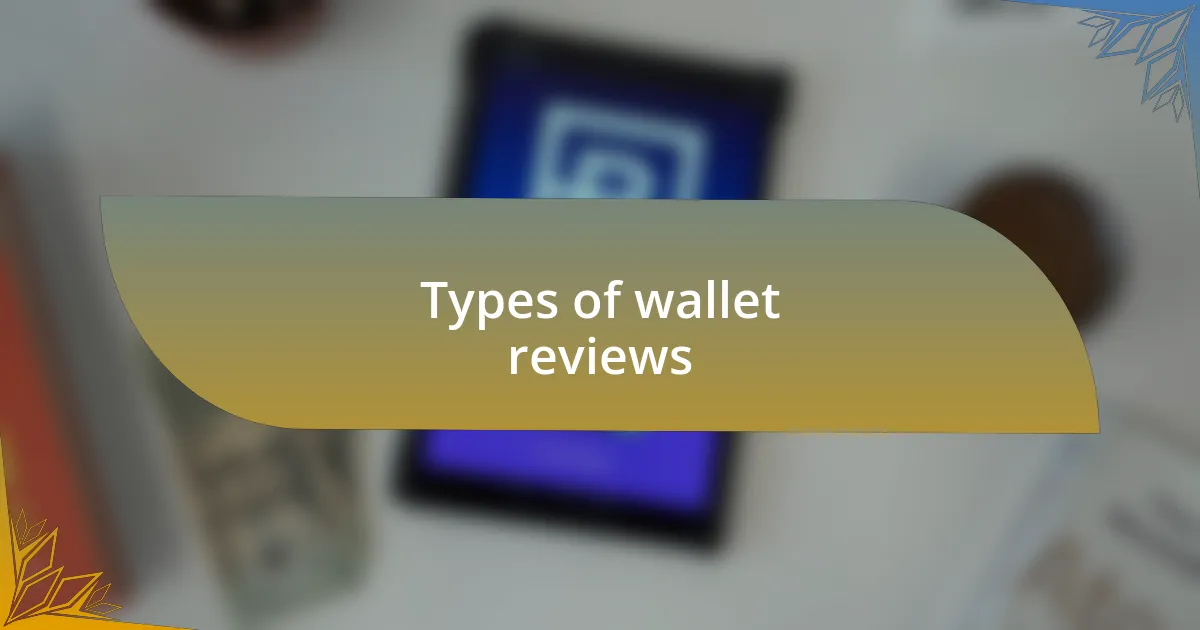
Types of wallet reviews
When I think about the different types of wallet reviews, the first that comes to mind is the technical review. These reviews delve deep into the wallet’s features, security protocols, and performance metrics. I remember reading one such review that dissected every aspect of a wallet’s code, revealing potential vulnerabilities. This level of detail not only gave me peace of mind but also inspired me to look further into the wallet’s background before making my choice. Have you ever stumbled upon a technical review that changed your perspective on a cryptocurrency wallet?
Another crucial type of wallet review is the user experience review, which focuses on how real users interact with the wallet. I once found a review where a user shared their experience navigating the wallet during a frantic trading moment. Their description of how seamless the process was reassured me that I wouldn’t lose time when it mattered most. These narratives can be enlightening because they highlight practical day-to-day usage, rather than just theoretical features. In your experience, how often do user narratives shape your opinion of a wallet?
Finally, there are comparative reviews, which analyze multiple wallets side by side, weighing their pros and cons. I recall reading a piece that compared three popular wallets and really opened my eyes to the strengths and weaknesses of each. This approach makes it easier to sift through options without feeling overwhelmed, as it lays out the facts in a clear manner. Have you ever found a comparative review that helped clarify your decision process?
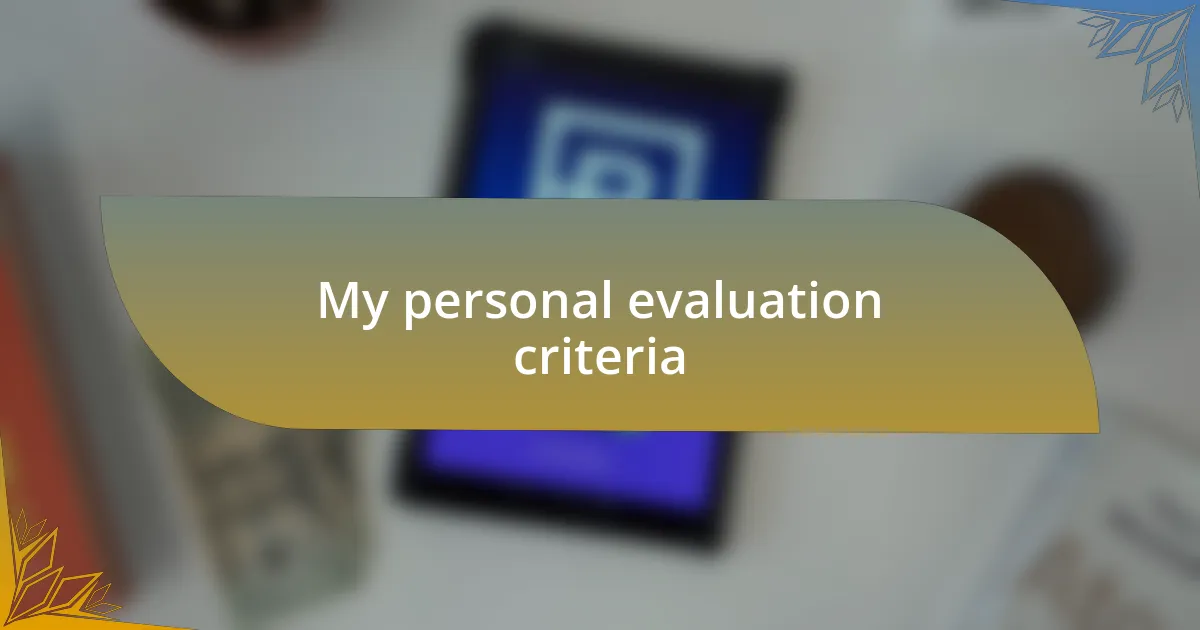
My personal evaluation criteria
When I evaluate wallet reviews, I start with security features. I can’t stress enough how crucial this aspect is—after all, we’re talking about safeguarding our assets. I once overlooked a review that dismissed a wallet’s security flaws, only to later find out those issues led to significant losses for some users. How do you assess security when considering a new wallet?
Next, I pay close attention to user interface design. A wallet might boast the best security, but if it’s difficult to navigate, I know it could lead to mistakes during trading. I remember choosing a wallet that many users praised for its intuitive design, and I personally found it made my trading much smoother. Isn’t it easier to trust a wallet when its design feels right?
Finally, I look for community feedback, as real users can provide insights that formal reviews might miss. There was a time I followed a wallet closely on forums before deciding to try it out. Users discussed both the highs and lows, which gave me a well-rounded view and helped me make an informed decision. How do you factor in community opinions when evaluating wallets?
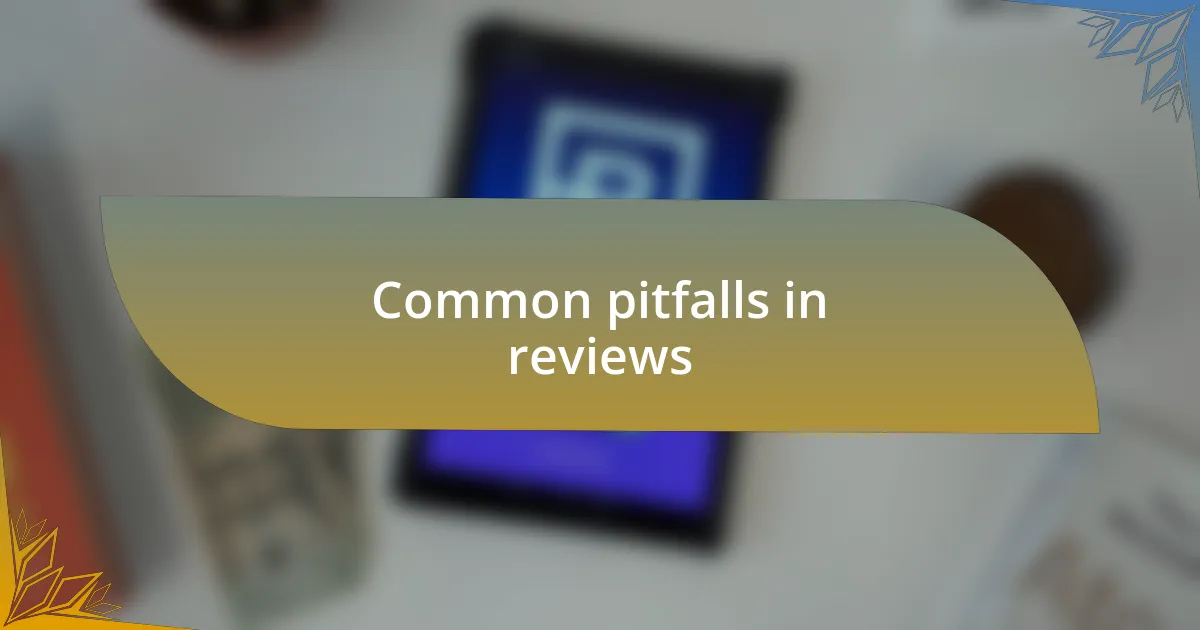
Common pitfalls in reviews
When reading wallet reviews, one common pitfall is overemphasis on features without addressing practicality. I’ve encountered reviews glowing about a wallet’s numerous options, only to realize later that these features made it unnecessarily complex. Have you ever faced a situation where a tool was just overkill? Simplicity often leads to better user experiences.
Another issue arises when reviews rely heavily on promotional language rather than genuine assessments. I’ve seen reviews that sound more like marketing pitches, glossing over potential downsides. It leaves me wondering, are they incentivized to promote these wallets? Authenticity is key; I prefer reviews where the author gives a honest account of both pros and cons.
Many reviews also fail to consider the longevity of a wallet in terms of updates and support. In my experience, a wallet may initially perform well, but if it doesn’t evolve with changing security needs, it can become obsolete. Have you ever been caught off guard by a lack of support or updates? I’ve learned to check for signs of ongoing development and engagement from the team behind a wallet before making a decision.
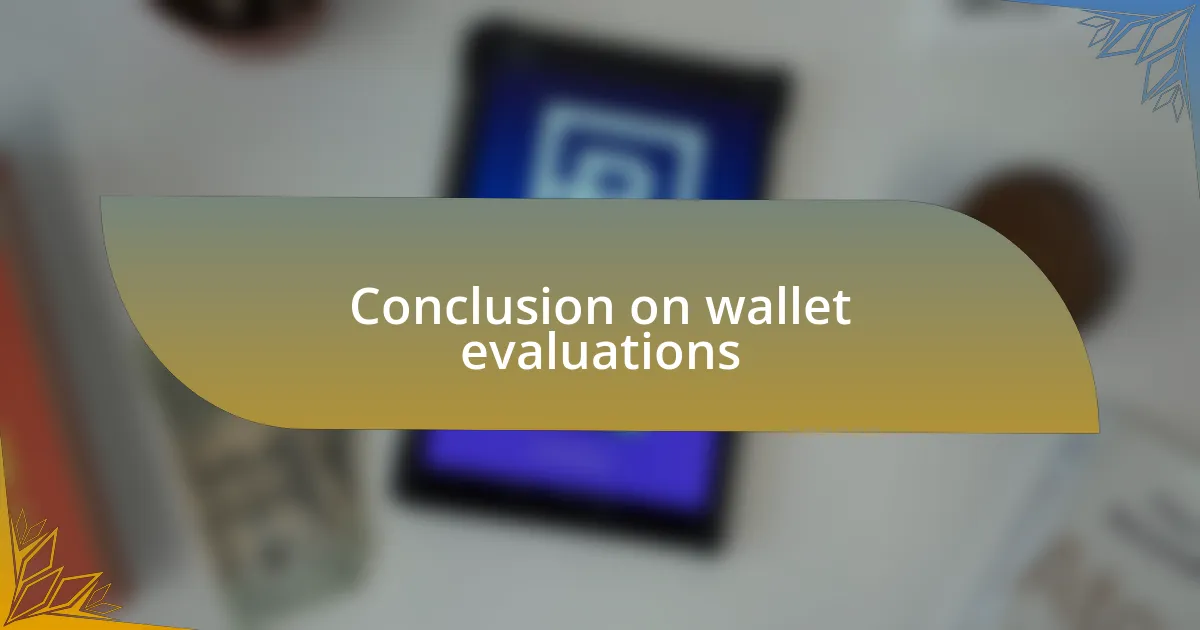
Conclusion on wallet evaluations
Evaluating wallet reviews leads me to prioritize practicality over flair. I remember once being swayed by a review that hailed an advanced wallet with all the bells and whistles. It sounded impressive at first, but I found myself struggling to navigate its features. Do you ever wonder if a sleek interface is worth the hassle? I learned that sometimes, less truly is more when it comes to user experience.
Authentic reviews make a significant difference, too. There was a time when I relied on a high-rated wallet, only to discover later that the review was backed by promotional jargon rather than genuine insights. It felt like a betrayal; I value transparency and honest critiques above all else. How can we trust a recommendation that glosses over the negatives? My experience has taught me to read between the lines, seeking out evaluations that tackle both strengths and weaknesses head-on.
Lastly, I can’t stress enough the importance of ongoing support in wallet evaluations. I once invested in a wallet that seemed promising, but a few updates later, I realized the developer had stopped responding to user feedback. It left me feeling abandoned and vulnerable. When you evaluate wallets, ask yourself: Is this platform committed to its users in the long run? The answers to these questions can save you from future headaches and losses in the ever-evolving world of cryptocurrency.